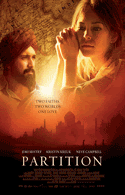
Country Origin: USA
Right away, you know that this is going to be a pretty good movie because Anthony Hopkins is in it; not to mention a pretty famous co-star in Brad Pitt. Meet Joe Black is a fairly simple, gentle-paced story about life, love, and passion. Joe Black, played by Pitt, begins the movie as a young, flirty, attractive man, who experiences a love-at-first-sight encounter with Susan Parrish, played by Claire Forlani, who also feels this connection. It appears as an electrifying start to a relationship when suddenly, Pitt is brutally killed. The scene where Pitt dies always shocks me a bit because you just don't kill off a main character in the first five minutes! Fortunately for all you ladies, Pitt returns shortly after, but not as himself...Susan's father, William Parrish--played by Hopkins--is a successful middle-aged man who is realizing that death is calling him--literally! When Pitt makes his second debut, his character's body is the host of Death. The way in which Pitt transforms his once comical, witty, and charming character, into a stern, dull, and yet intriguing man (death), is eerily achieved.
Joe Black requests that William Parrish be his guide in the world, while in return, biding William a few more precious weeks on earth. The unexpected appearance of Pitt in the Parrish household, brings surprise and confusion to Susan, who just met him only a few hours before. Throughout the rest of the movie, Susan finds herself falling in love with the "new Joe", all while William is struggling to keep his company from falling into hands of corruption in his final days. The way that Hopkins tries to deal with death looming around him, his company's power struggle, and his daughter now falling in love with death, is a stressful yet comical intertwining situation, in which the audience falls in love with the curious Joe Black/Death, the loving William Parrish, and the gorgeous Susan Parrish.
This is such a powerful film in the sense that we feel all of the many frustrations that William is feeling as a result of death inviting itself into his life and that of his family's. The lessons of love are continuously explored in the film, along with the importance of spending the short time we have on earth with the people we love. Another powerful aspect of this film is the soundtrack. The build-ups and melodies fit the movie perfectly and really adds to the emotions felt during the film. I don't think I can choose a favorite character in Meet Joe Black because I love the roles that all of the cast play, and every time I see this movie, I find something new that I love about it. It may seem slow to some people but once you get into it, you'll be drawn in with anticipation.
http://www.youtube.com/watch?v=s53zVYGihSs



























 "Groovy."
"Groovy."








